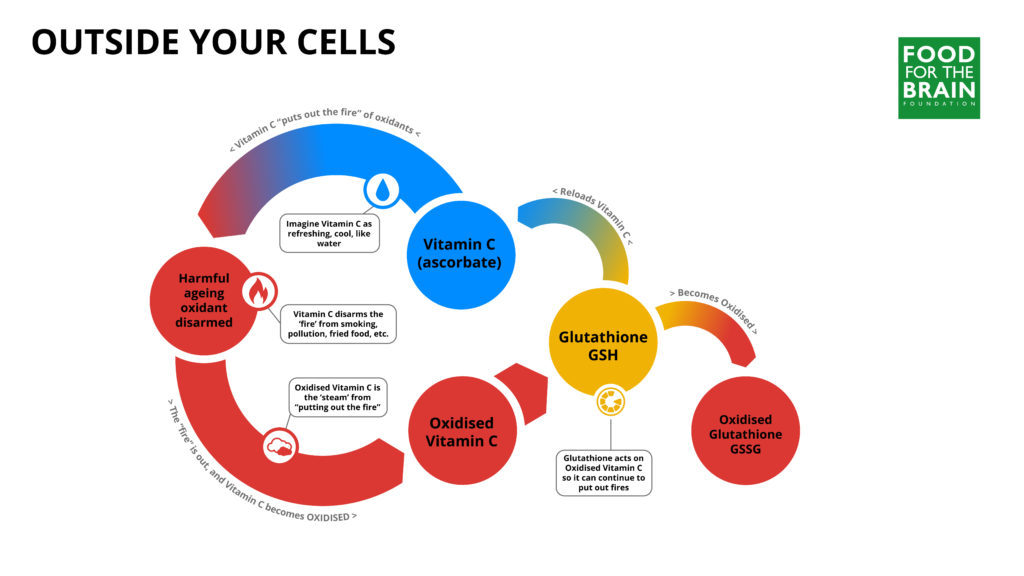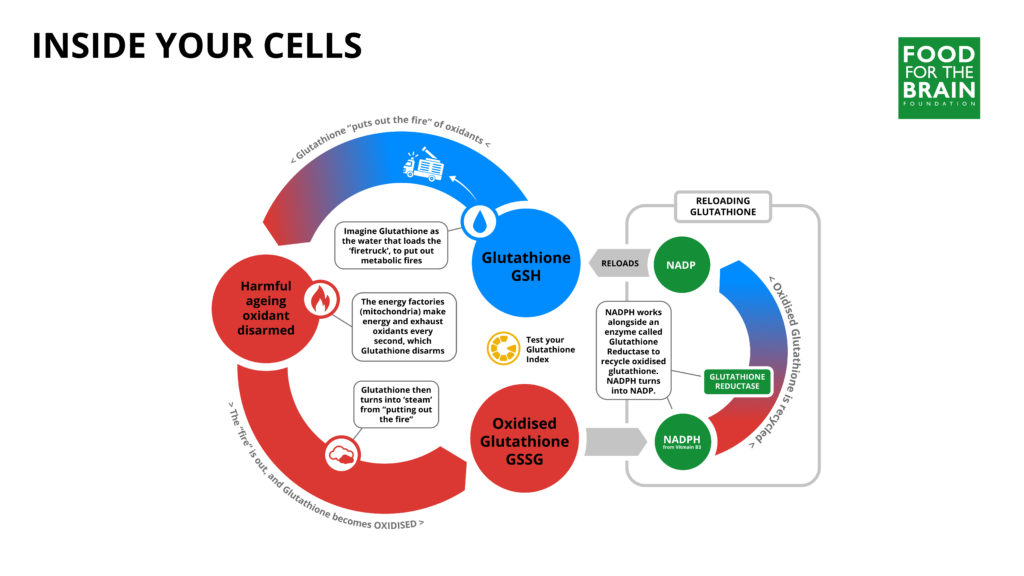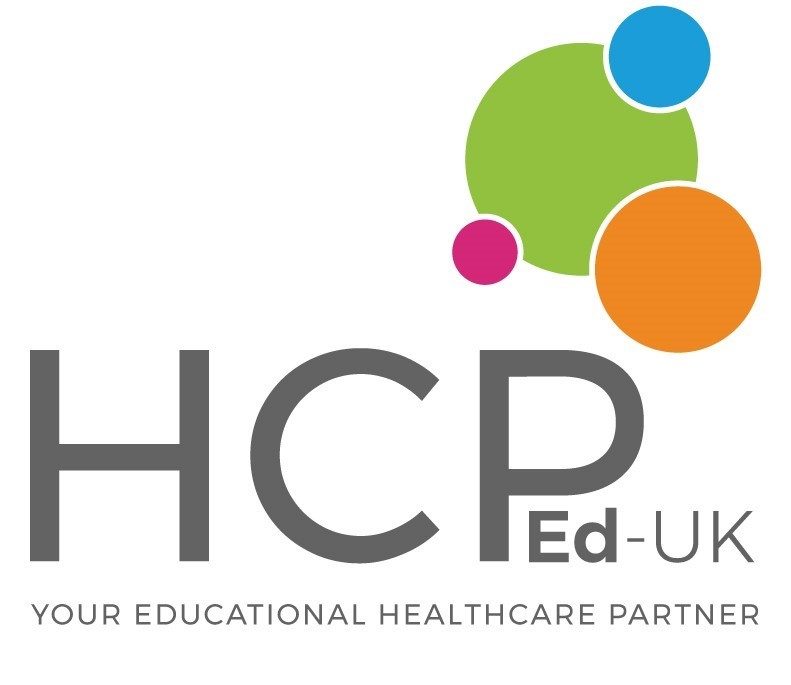Anti-ageing your brain with the glutathione breakthrough.
A new simple home pin-prick blood test, The Glutathione Index test that can predict your dementia risk
Your brain consumes more energy than any other organ. This combustion creates exhaust – oxidants – that age your brain. These oxidants also make skin wrinkly, joints stiff and literally create inflexibility in the brain that leads to cognitive decline.
Those with diets high in antioxidant foods literally halve their risk for dementia compared to those with low intakes, according to a recent study of 2,716 people aged over 60.[i]
Also, critical antioxidants such as vitamin C and vitamin E, if supplemented together, reduced the risk of developing Alzheimer’s by as much as two-thirds. Taking either cut risk by a quarter in a study of 4,740 elderly residents of Cache County, Utah.[ii]
A study of all studies to date demonstrated that ‘either a high vitamin E or high vitamin C intake showed a trend of attenuating [dementia] risk by about 26 per cent’ according to China’s leading Alzheimer’s prevention expert Professor Jin Tai Yu of Fudan University in Shanghai. This study shows that these nutrients are ‘grade 1’ top level dementia prevention factors.[iii]
Vitamin C, which is water based and protects you against smoke and pollution, and vitamin E, which is fat based, and protects you from burnt and fried fats, including sunburn, are both in the bloodstream outside of cells. Once the Vitamin C has been used by the body it is ‘spent’ or ‘oxidised’. This oxidised vitamin C is reloaded, in other words, returned to its useful, active antioxidant state, by glutathione. Spent (oxidised) vitamin E is reloaded by Co-enzymeQ10, which is why these nutrients are often included together in antioxidant supplements.
Explanatory diagram can be downloaded here: Glutathione_OUTSIDE CELLS.jpg

Inside cells, especially brain cells, is the most potent antioxidant of all; glutathione. “It is the master antioxidant” says Patrick Holford who chairs the Alzheimer’s Prevention Project scientists at the charity foodforthebrain.org. “Your glutathione status is the best measure of your anti-ageing potential, keeping brain and body actively rejuvenated.”
The charity has developed a simple home pin-prick test, called the Glutathione Index, to help you know if your brain is ageing too fast.
“Every second there are hundreds of thousands of metabolic ‘fires’ going on inside the energy factories in our brain cells. Think of Glutathione as the water in the fire engine. It gets rapidly used up keeping your brain protected. The ‘spent’ or oxidised glutathione, much like steam, then has to be cooled to reload the fire engine. This is done by vitamin C and an enzyme called Glutathione Reductase, returning Glutathione back to its fully loaded active antioxidant form. How Glutathione and vitamin C recycle each other is one of the hottest discoveries in brain anti-ageing.”
Explanatory diagram can be downloaded here: Glutathione_INSIDE CELLS.jpg

Brain scientists have discovered that the ratio between the fully loaded Glutathione and the spent Glutathione, called the Glutathione Index, identifies risk for dementia. This is what the charity is measuring and researching, along with a free Cognitive Function Test, which anyone can take.
The worse the ratio, the worse a person’s cognitive function is. It’s a bit like having a direct measure of how fast your brain is ageing. “Patients with dementia have a reduction in glutathione and its ability to be recycled. [iv] This ratio, the Glutathione Index, is a biomarker for many diseases, including both type 1 and 2 diabetes, liver cirrhosis, multiple sclerosis and Alzheimer’s disease.” says Dr Konrad Kowalski, the analytic chemist in the brain team which has developed the Glutathione Index test at Food for the Brain’s lab.
“It’s too early to know the perfect number but it is looking like a Glutathione Index of 500 means your brain can roll with the punches, while below 200 a person definitely needs to be both changing their diet and supplementing antioxidants. Having a way to measure brain ageing with a home test kit from a pin prick of blood, means we can realistically see what the impact of specific diet changes and antioxidant supplements might be.”
Foodforthebrain.org is looking for volunteers to both take the blood test, which costs £69, and complete a Cognitive Function Test and a diet and lifestyle questionnaire now, then in three months, and again six months later. The volunteers will also follow, as best as possible, personalised advice on how to increase their antioxidant potential to anti-age their brain.
“The brain is built out of omega-3 (found in seafood, for example), and B vitamins (found in wholefoods) and is protected by antioxidants. When a person has the optimal intake of all three, the brain literally sings – you feel alert, calmer, smarter and sleep better. Good sleep is vital as that’s when the antioxidants kick in to repair, recover and reload your brain.” says Holford.
To join the Anti-Age Your Brain project visit www.foodforthebrain.org/antiage
Watch this film to understand how antioxidants work as team players: https://vimeo.com/986506745
The references to the studies referred to in this article, are given below:
[i] Peng, M., et al. Dietary Total Antioxidant Capacity and Cognitive Function in Older Adults. J Nutr Health Aging (2023).
[ii] Basambombo LL, Carmichael PH, Côté S, Laurin D. Use of Vitamin E and C Supplements for the Prevention of Cognitive Decline. Ann Pharmacother. 2017 Feb;51(2):118-124. doi: 10.1177/1060028016673072. Epub 2016 Oct 5. PMID: 27708183.
[iii] Yu JT, Xu W, Tan CC, Andrieu S, Suckling J, Evangelou E, Pan A, Zhang C, Jia J, Feng L, Kua EH, Wang YJ, Wang HF, Tan MS, Li JQ, Hou XH, Wan Y, Tan L, Mok V, Tan L, Dong Q, Touchon J, Gauthier S, Aisen PS, Vellas B. Evidence-based prevention of Alzheimer’s disease: systematic review and meta-analysis of 243 observational prospective studies and 153 randomised controlled trials. J Neurol Neurosurg Psychiatry. 2020;91(11):1201-9. Epub 2020/07/22. doi: 10.1136/jnnp-2019-321913. PubMed PMID: 32690803; PMCID: PMC7569385.
[iv] Martínez de Toda I, Miguélez L, Vida C, Carro E, De la Fuente M. Altered Redox State in Whole Blood Cells from Patients with Mild Cognitive Impairment and Alzheimer’s Disease. J Alzheimers Dis. 2019;71(1):153-163. doi: 10.3233/JAD-190198. PMID: 31356205.; see also Park SA, Byeon G, Jhoo JH, Kim HC, Lim MN, Jang JW, Bae JB, Han JW, Kim TH, Kwak KP, Kim BJ, Kim SG, Kim JL, Moon SW, Park JH, Ryu SH, Youn JC, Lee DW, Lee SB, Lee JJ, Lee DY, Kim KW. A Preliminary Study on the Potential Protective Role of the Antioxidative Stress Markers of Cognitive Impairment: Glutathione and Glutathione Reductase. Clin Psychopharmacol Neurosci. 2023 Nov 30;21(4):758-768. doi: 10.9758/cpn.23.1053. Epub 2023 Jul 14. PMID: 37859449; PMCID: PMC10591176; see also Forman HJ, Zhang H, Rinna A. Glutathione: overview of its protective roles, measurement, and biosynthesis. Mol Aspects Med. 2009 Feb-Apr;30(1-2):1-12. doi: 10.1016/j.mam.2008.08.006. Epub 2008 Aug 30. PMID: 18796312; PMCID: PMC2696075.
